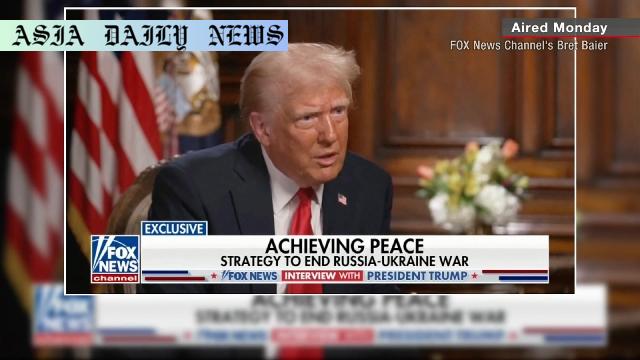Ukraine remains a focal point as Trump hints at potential future alliances, resources, and territorial outcomes.

Introduction: Trump’s Controversial Remarks on Ukraine
Recently, US President Donald Trump made polarizing comments regarding Ukraine’s future, suggesting that the country “may or may not be Russian someday.” These remarks have ignited fierce debate about their implications for international diplomacy, regional stability, and the ongoing conflict in Eastern Europe. Trump also expressed openness to a deal involving Ukraine’s natural resources in exchange for continued American military aid, a prospect that raises concerns about potential territorial concessions to Russia.
Rare Earth and Resource Motivation
During an interview with Fox News, President Trump elaborated on the vast natural wealth of Ukraine. He emphasized its potential in rare earth minerals, oil, and gas. From his perspective, the United States’ significant financial investment—reported to be in the hundreds of billions of dollars—should yield strategic returns. This stance has raised eyebrows, as it introduces a transactional approach to what many see as a critical geopolitical and humanitarian crisis.
The Controversy Over Territorial Remarks
One of the most disconcerting aspects of Trump’s comments was the seeming openness to the idea that Ukrainian territories could become Russian-controlled in the future. These statements give way to interpretations that the US might support—or at least not oppose—territorial concessions. For Ukraine, which has been defending its sovereignty against Russian incursion since 2014, such a stance could have far-reaching implications for morale and international support.
US Military Aid and Political Dynamics
Adding another layer of complexity is the continuation of US military aid to Ukraine. This support, initially approved under Trump’s predecessor Joe Biden, remains a lifeline for the embattled nation. Trump’s envoy for Ukraine and Russia, Keith Kellogg, confirmed the flow of weapons and indicated plans to visit Ukraine. Additionally, Vice President JD Vance is slated to meet with Ukrainian President Volodymyr Zelenskyy to discuss potential strategies and partnerships. These developments highlight the dual-pronged approach of maintaining aid while exploring future negotiations.
The Broader Implications for Global Politics
Trump’s remarks are not only drawing the ire of Ukrainian officials but also raising concerns among NATO allies. If the United States is perceived as wavering in its commitment to Ukraine’s territorial sovereignty, it could embolden Russia and shake trust in Western alliances. For Europe, where many nations share borders or have close ties with Ukraine, this is a matter of regional security as much as it is about principles of international law.
Public and Political Reactions
Domestically, Trump’s comments have prompted criticism and support along sharply divided partisan lines. While some view his approach as pragmatic, focusing on America’s economic interests, others see it as a dangerous precedent that undermines US credibility on the global stage. The reaction from the international community has been similarly divided, with some countries expressing alarm at the prospect of territorial negotiations involving Ukraine.
Conclusion: A Balancing Act
As the situation unfolds, the United States faces a delicate balancing act. On one hand, sustaining Ukraine’s defense capabilities is crucial not only for the country’s survival but also for the broader principles of territorial sovereignty. On the other hand, Trump’s comments signal a willingness to explore nontraditional outcomes, which could redefine the geopolitical landscape of the region. The ultimate outcome will depend on diplomatic strategies, international alliances, and the evolving dynamics of US leadership.
Commentary
A Pragmatic or Problematic Approach?
President Trump’s comments regarding Ukraine highlight a stark divide in perspectives. On one hand, his position emphasizes a transactional approach that seeks to prioritize American investments and interests. Given the substantial financial outflow for military support, it is understandable that some Americans may share his concern about securing tangible returns. However, such a viewpoint drastically oversimplifies the geopolitical complexity and ethical considerations of the ongoing conflict.
The Risk of Undermining Alliances
Trump’s remarks about the potential loss of Ukrainian territory to Russia raise red flags for Ukraine’s allies. This perceived ambivalence could signal to Russia that territorial conquest may be met with indifference or even tacit acceptance from a leading global power. In the broader context, this damages the credibility of alliances like NATO, which rely on firm commitments to shared principles and defense. Such wavering could embolden authoritarian regimes and shift the balance of power globally.
The Ethical Dilemma
Beyond strategic or financial considerations lies an ethical dimension: the right of a sovereign nation to self-determination. Ukraine’s people have fought tirelessly to maintain their independence, and dismissing their efforts in favor of resource-focused deals could undermine the moral high ground the United States has traditionally held. It is essential for global leaders to maintain principles in their foreign policy decisions, especially when dealing with aggression and occupation.
Conclusion: A Need for Clarity
In conclusion, while Trump’s pragmatic approach may resonate with some, it risks alienating allies, emboldening adversaries, and undermining democratic values. Clarity and consistency are desperately needed in the United States’ stance on Ukraine, particularly as global tensions show no signs of abating. Leaders must strike a careful balance between pragmatic interests and principled commitments to ensure long-term peace and stability.


